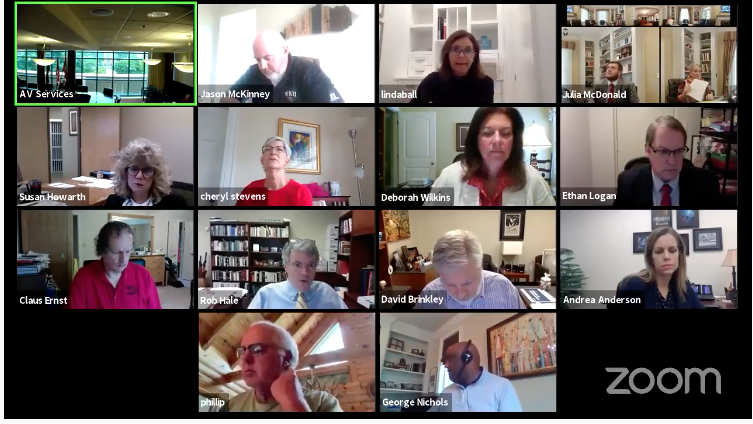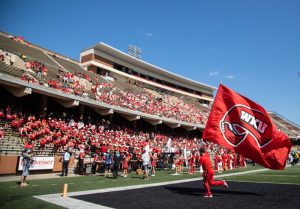WKU not imposing pay cuts to address budget shortfall
May 15, 2020
WKU will not impose pay cuts for most faculty and staff starting July 1, President Timothy Caboni told the Board of Regents on Friday. Instead, he said, the amount that departments across the university must cut their budgets will increase to $10.5 million from $8.1 million to help close an expected deficit in 2020-21 from COVID-19.
Last week, the Budget Executive Committee presented its recommendations to address the university’s deficit, which included faculty and staff pay cuts. Caboni said within the past week many employees expressed concerns about the move.
In a press conference after the meeting, Caboni said a budget is a university’s “value statement.”
“We want to make sure everyone’s values are reflected in that budget,” Caboni said. “…We’ve been listening intently to make sure that as we craft the budget, in partnership with the Regents and the Board of Regents Finance Committee, that we craft what reflects, as much as it possibly can, the will of the community.
He also said the move empowers deans and vice presidents to make their own budgetary decisions.
“They know best where they might be able to find efficiencies, do cost avoidance and manage through the next year,” Caboni said.
Susan Howarth, executive vice president for strategy, operations and finance, said the proposed salary reduction had been moved into “division managed” reductions, totaling $10.5 million. This will leave decisions for reductions, including the $2.4 million that was going to come from pay cuts, up to deans and department heads.
“It seems to me that [tiered salary reductions] is just something that the campus was not interested in doing,” Caboni said in the meeting. “And so because of that, managing through in a way that follows our decentralized budget process.”
The university’s “centrally managed” reduction strategies total $18.9 million. The university is facing a deficit of $27 million in the coming year, expecting a 5% decline in enrollment and a 10% reduction in state funding because of the coronavirus pandemic.
The university’s projected revenue is $356 million and projected expenditures are $383 million, Howarth said.
“We are financially stable compared to other universities,” said Regent Jason McKinney.
Regents expressed concern over budgetary implications of reopening the university, including the finances involved in changing classrooms and stairways to allow for more social distancing as well as COVID-19 testing and tracing.
Caboni said there is money in the federal CARES Act to address the facilities’ safety, and the restart WKU committees are working on cost estimates as well. The reports from the COVID-19 task force will come out Monday, Caboni said.
An item which included raises in salary and stipend payments for some faculty, including some men’s football coaches, was passed 5-3, with one abstention.
“No faculty member can ever receive a raise to this percentage, this magnitude,” said Regent Claus Ernst regarding coaches receiving raises.
Ernst raised concern over the decision made in a time of uncertainty both for university employees and collegiate sports.
“I think that the signal we’re sending now is the wrong one,” Ernst said. The raises for six assistant football coaches ranged from $10,000 to $45,000, with the defensive coordinator’s paycheck going from $250,0000 to $295,000. The money for the raises is being funded from foundation accounts.
In response, Regent George Nichols said funding toward faculty and athletic staff wasn’t an “apples to apples comparison.” He said there is value in the skills and experiences faculty gives to students, but what coaches give to student athletes is valuable as well.
“I think all of us wish it were a fair and balanced system,” Nichols said. “Unfortunately, it’s not.”
When asked about the item, Caboni didn’t comment beyond Nichols’ response.
In other business, the regents approved moving Deborah Wilkins from general counsel, a position she has held for 25 years, to “special advisor” to the president as well as Interim Title IX coordinator. Andrea Anderson will become the general counsel after her employment agreement was approved. Both of these changes will be effective July 1 and both will be paid more than $178,000 a year.
Seven new certificates and two new degree programs were passed unanimously.
Undergraduate certificates in financial counseling, citizenship and social justice, workplace communication, game design, graphic design and paralegal studies are among those passed Friday. A graduate certificate in epidemiology was also passed.
The two new degrees passed include a Bachelor of Fine Arts in film production and a Bachelor of Science in environmental, sustainability and geographic studies.
“These are going to serve Western well,” said Regent Phillip Bale, referring to the new degree and certificate programs.
The privatization of the WKU bookstore passed Friday 7-2. Barnes & Noble College will start taking over operations of the WKU Store as of July 1. An analysis projects Barnes & Noble College will be generating $300,000 more annually when expected increased sales are taken into account.
“This partnership is important for the university in different ways,” Caboni said. He referred to the partnership between Barnes & Noble College and the WKU bookstore as “a financial win.”
Caboni said the shift to privatization will begin in the summer, but will not be finalized until January 2021.
“It’ll take a little bit of time,” Caboni said.
Laurel Deppen can be reached at laurel.deppen774@topper.wku.edu. Follow her on Twitter at @laurel_deppen. Cassady Lamb can be reached at cassady.lamb667@topper.wku.edu. Follow her on Twitter at @lambp0p.













